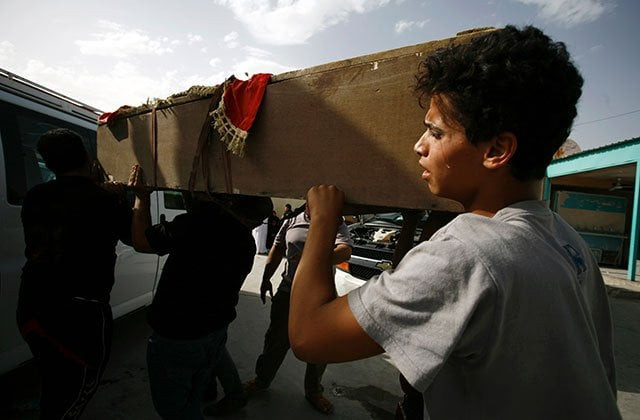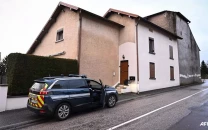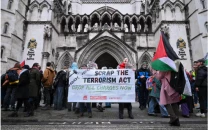Five facts about life in besieged, IS-held Fallujah
Stuck under the rule of jihadists and with no safe exits, the civilian population is struggling to survive.

Stuck under the rule of increasingly desperate and violent jihadists and with no safe exits, the civilian population is struggling to survive. PHOTO: AFP
Prime Minister Haider al-Abadi said the need to spare civilians was slowing his forces, which completely surrounded Fallujah but have stalled at the fringes of the city.
Stuck under the rule of increasingly desperate and violent jihadists and with no safe exits, the civilian population is struggling to survive.
At least 20,000 children trapped in Iraq's Fallujah: UN
Here are some examples of the living conditions they face:
Basic food goods have been in short supply for months and prices soared as the siege tightened. A kilo of sugar fetches $40 (35 euros), an amount very few remaining residents can afford.
The staple for trapped families has been dates. Flour is hard to find and expensive, forcing people to eat an unpopular form of barley bread or make their own flour by grinding date stones after roasting them.
More than 20 killed in series of bombings in Baghdad, police say
One resident told AFP that families have been mixing animal feed with cereals to give their children. "When my nephew smells the bread I give him, he turns away and refuses to eat it," she said.
An elderly woman who escaped from a Fallujah suburb last week said IS fighters keep all the best food for themselves. One family that made it to a camp south of Fallujah had their first meal of rice in two years.
The water situation is equally bad in the city, which has not received any aid shipment since September 2015.
Residents say they have not had safe drinking water in months. Men and boys ride to the Euphrates on bicycles every day to fetch water from the river for their neighbourhood.
For those who have managed to flee and are now being housed in camps outside the city, the water situation is also precarious.
The Norwegian Refugee Council (NRC) says the aid effort is underfunded and its delivery of safe water to displaced Fallujans is threatened.
Most families have not had any electricity in months. State-supplied power is intermittent at best in the rest of the country and Fallujah residents rely on generators.
More than 20 killed in series of bombings in Baghdad, police say
The Islamic State group controls fuel distribution and gives priority to its fighters and those who have clearly pledged allegiance to their organisation.
Residents have resorted to makeshift petrol lamps made with crude oil and a piece of string in glass bottles sealed with date paste -- a trick many Iraqis used when sanctions were imposed in the 1990s.
Just like food and water, basic medicines are scarce and IS members are saving what is left for themselves. There is no baby milk.
This is how one 40-year-old woman reached by NRC described the situation at Fallujah hospital:
"There is no medicine for ordinary people. The doctor is affiliated with IS and he refuses to help ordinary people. Instead of providing adequate treatment, doctors often simply amputate a patient's arms or legs if they are in pain."
The city is being shelled by the artillery of government forces. The lack of access makes it almost impossible to estimate the number of civilian casualties but residents say there have been many in recent months.





1644560129-0/download-(20)1644560129-0-208x130.webp)












COMMENTS
Comments are moderated and generally will be posted if they are on-topic and not abusive.
For more information, please see our Comments FAQ